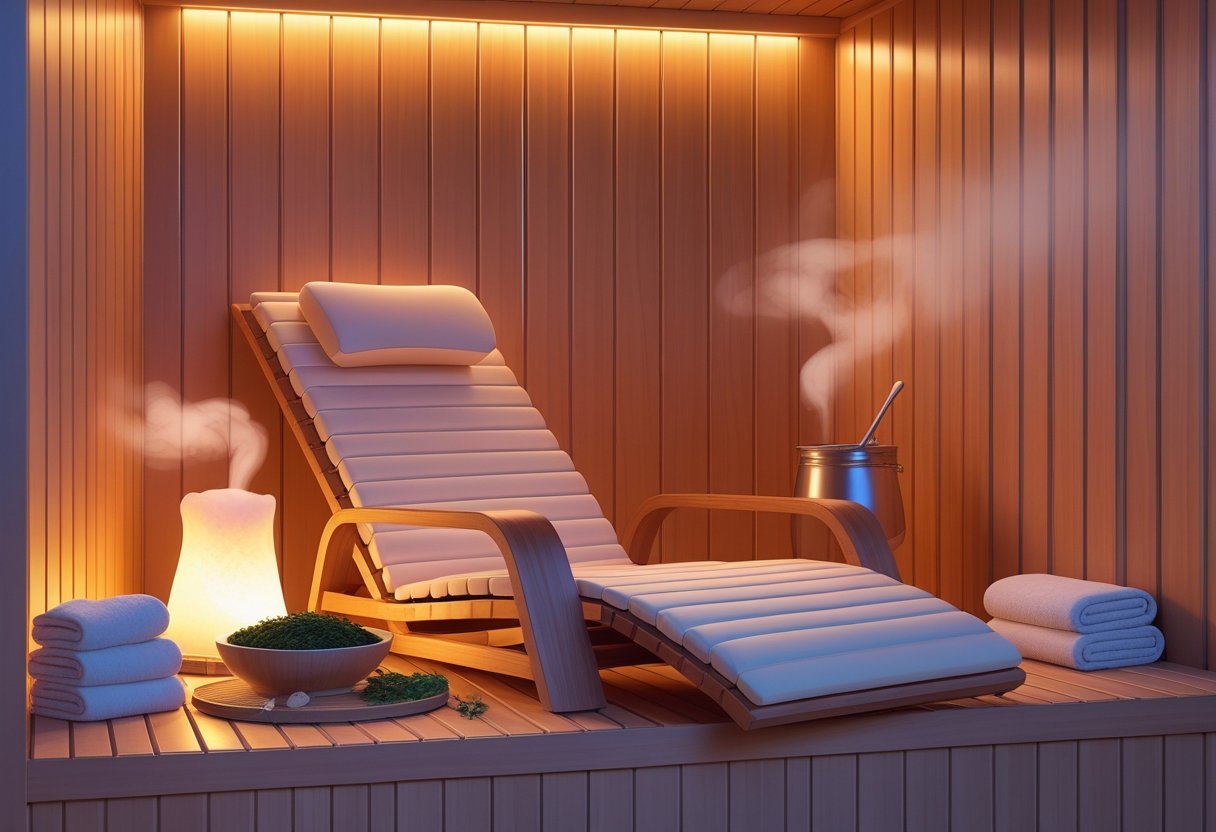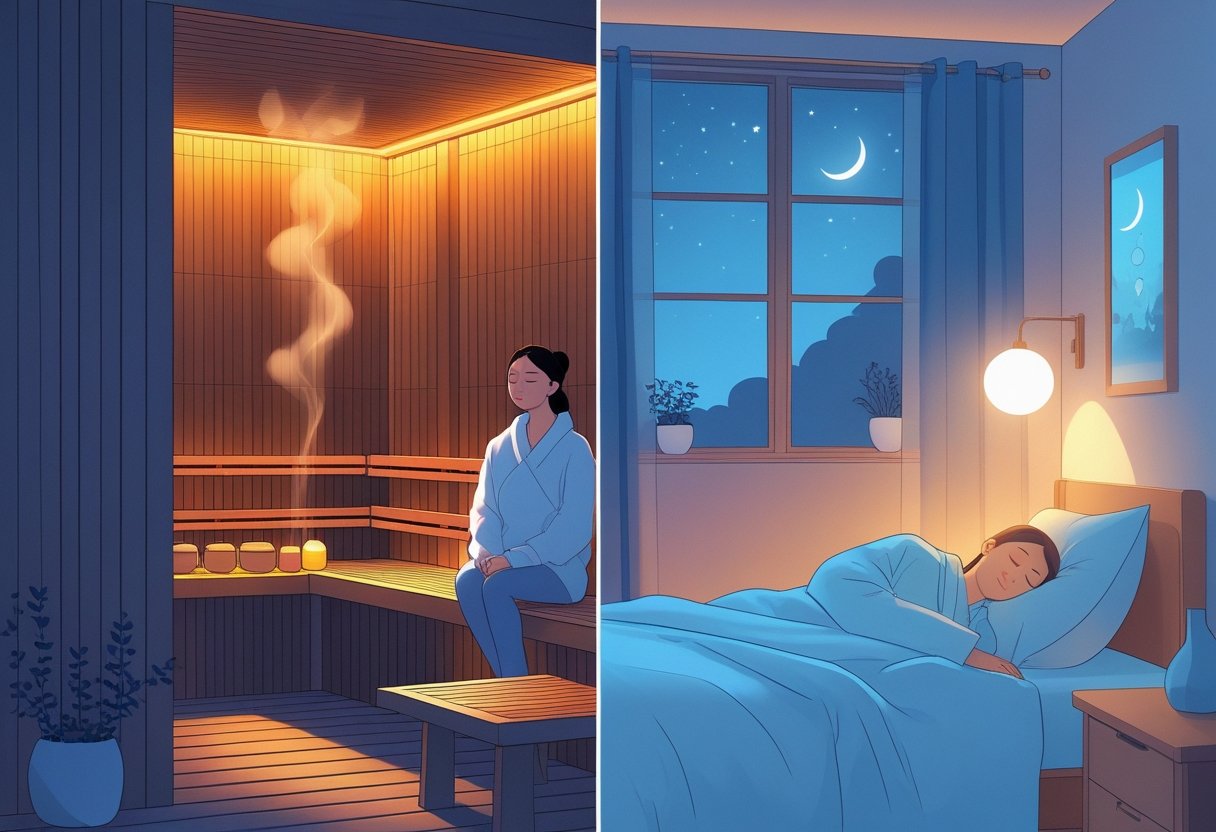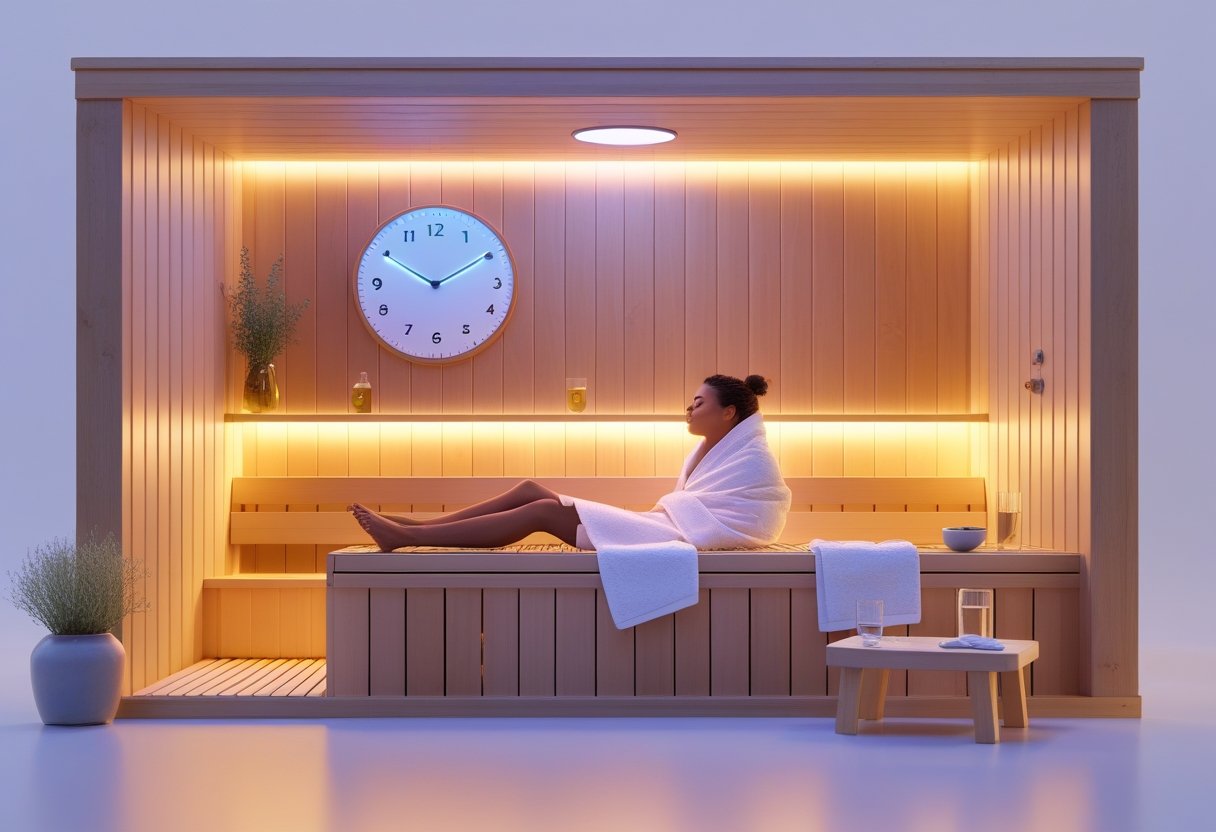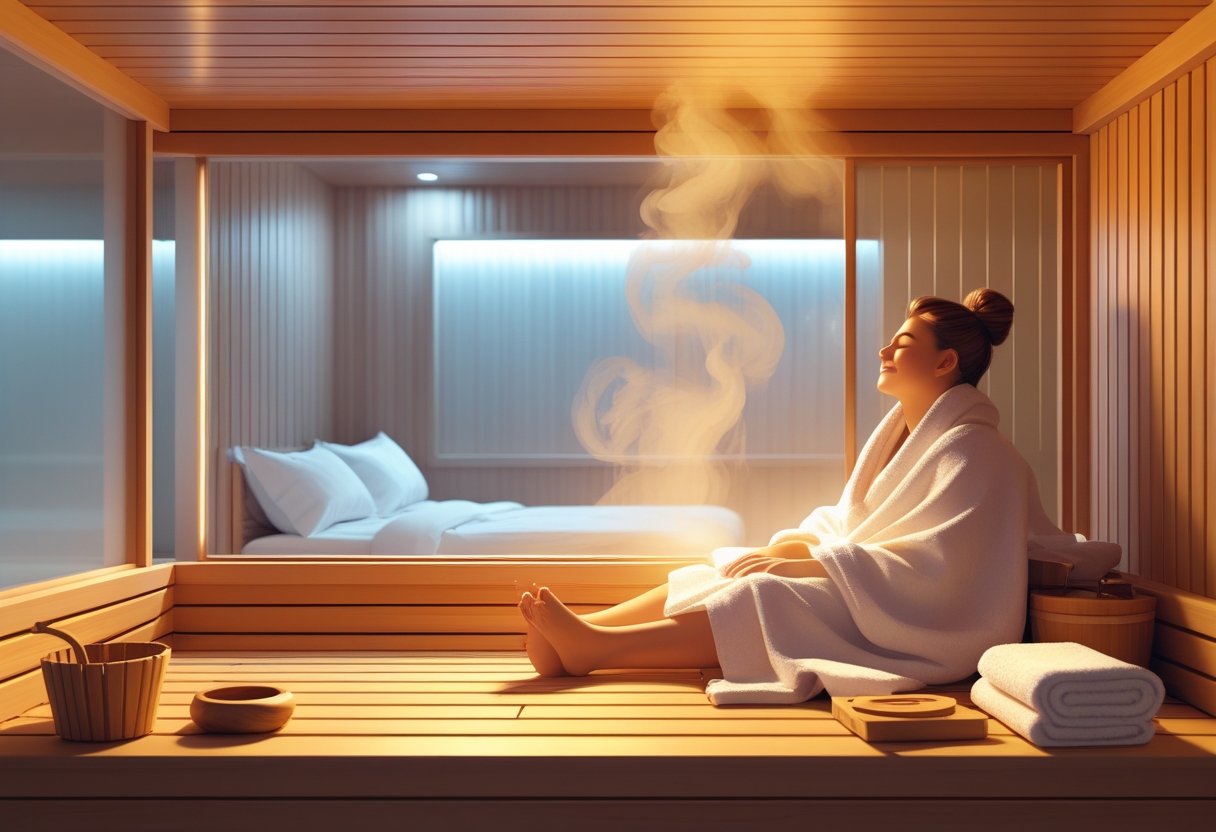Saunas can be a great way to improve sleep by helping the body relax and get ready for rest. When you use a sauna before bed, your body temperature rises, and as it cools down afterward, it signals the body to start producing melatonin — the hormone that helps you fall asleep. This natural process can lead to deeper, more restful sleep.
A lot of people find that spending time in a sauna during the evening makes it easier to fall asleep faster and enjoy better sleep quality throughout the night. Studies show that regular sauna users often feel more refreshed and energized during the day. While different types of saunas can offer similar sleep benefits, getting the timing and temperature right can make a big difference.
Knowing how and when to safely use a sauna can help you get the most out of it. It’s also a good idea to take your personal health into account before making sauna sessions a regular part of your nighttime routine, especially if you plan to use them close to bedtime.
Key Takeaways
- Sauna use before bed helps improve the speed and quality of sleep.
- The cooling down period after a sauna triggers natural sleep signals.
- Safe and timed sauna use can support a healthier sleep routine.
- Pairing sauna sessions with a supportive, comfortable mattress can enhance the overall sleep experience and help maintain deeper rest throughout the night.

Using a sauna can influence sleep by raising your body temperature and helping your muscles relax. It may improve how long you sleep and how deeply you rest. These effects are tied to shifts in hormone levels and the body’s natural sleep-wake rhythm.
The Science Behind Sauna and Sleep
When your body heats up in a sauna, it kicks off a cooling process afterward. This drop in temperature signals your brain to start producing melatonin. With more melatonin, it often becomes easier to fall asleep and stay asleep.
Sauna sessions also relax the muscles and ease physical tension, making it easier for the body to wind down. Research shows this can lead to longer periods of deep sleep and fewer restless moments during the night. Regular sauna use may also help reduce stress, a common barrier to good sleep.
Does Sauna Help You Sleep?
Studies suggest that using a sauna before bedtime can lead to deeper, more restful sleep. Many people say they fall asleep faster and wake up feeling more refreshed. The calm, relaxed state that follows a sauna session can also reduce early-night awakenings and help improve how long you sleep.
In one Swedish study, people who used saunas rated their sleep quality higher than those who didn’t. They also said they felt more energetic during the day. These benefits were stronger among people who used the sauna regularly, rather than just occasionally.
Sauna and Circadian Rhythm
Your circadian rhythm — the body’s internal clock — controls when you feel awake and when you get sleepy. It’s closely linked to changes in body temperature. Sauna use raises your core temperature, followed by a cooling-off period, which mirrors the natural fluctuations that help set your sleep-wake cycle.
By encouraging this temperature shift, sauna bathing may help reset circadian rhythms, especially for people who struggle with irregular sleep patterns. That can lead to better sleep timing, more restful nights, and a more consistent routine.
Different types of saunas affect how the body responds to heat and relaxation, which can play a role in sleep quality. Some saunas raise your core body temperature quickly, while others warm you up more gently. The way heat impacts your body before bed can make a difference in how well you sleep.
Infrared Sauna and Sleep
Infrared saunas use light to heat your body directly, without warming the air around you. This creates a steady, deep heat that efficiently raises core body temperature.
Warming up the body before bedtime can help signal the brain that it’s time to wind down. Once you step out of the sauna, your body starts to cool, and that drop in temperature is linked to falling asleep more easily and improving sleep quality.
Many people find infrared saunas more comfortable than the high heat of traditional saunas. Their gentle warmth and faster heat-up time make them a popular choice before bed, helping to relax muscles and quiet the mind.
Traditional Sauna Effects
Traditional saunas heat the air to high temperatures — usually between 150°F and 195°F — to quickly raise your core temperature. The intense heat makes you sweat, which helps reduce stress and loosen tight muscles.
Using a traditional sauna before sleep can leave the body feeling deeply relaxed, which may support better rest. However, the strong heat might feel too intense for some people, especially if used too close to bedtime or for too long.
This type of sauna also boosts blood circulation and can improve heart rate variability, both linked to healthier sleep. Timing matters here: using a traditional sauna at least an hour before bed gives your body time to cool down naturally and prepare for sleep.
Steam Room for Sleep
Steam rooms create moist heat at lower temperatures — typically between 110°F and 120°F — with nearly 100% humidity. This warm, steamy environment can open up your airways and soothe your respiratory system.
If you deal with congestion, allergies, or asthma, spending time in a steam room before bed might make breathing easier, which supports restful sleep. The moist heat also relaxes muscles and creates a calming, spa-like sensation.
Because steam rooms don’t raise body temperature as sharply as dry saunas, the cooling-down period afterward is more gradual. This makes them a great option for those who are sensitive to high heat but still want to unwind before bed.
Using a sauna at the right time can make a big difference in how well it supports sleep. The body needs time to cool down after a sauna session, and that cooling phase plays a key role in helping you relax and fall asleep more easily. Picking the best time to use a sauna means finding the right balance between heat exposure and your body’s natural rhythms.
Sauna Before Bed
It’s best to finish your sauna session about 1 to 2 hours before going to bed. This gives your body enough time to cool down and lower your core temperature — a key part of feeling sleepy. The warmth from the sauna helps ease muscle tension and calm the mind, setting the stage for a restful night.
If you use the sauna too close to bedtime, your body may still be too warm, making it harder to drift off. That post-sauna cool-down is important for triggering the body’s natural sleep signals. A good routine is to enjoy your sauna, then unwind in a cooler space to ease into rest mode.
Is Sauna Good Before Bed?
Using a sauna before sleep can boost sleep quality by helping you relax and release stress. The heat raises your body temperature, and the cool-down that follows signals your system to start winding down. Experts say this can be especially helpful for people who have trouble falling asleep or staying asleep.
But timing is everything. Hopping into bed right after the sauna isn’t ideal because your body needs a little time to cool off. Research shows that using a sauna 1 to 3 hours before bedtime is the sweet spot for supporting sleep without disrupting it.
Morning vs. Night Use
Whether you sauna in the morning or at night depends on what you’re looking to get out of it. Morning sessions can wake you up, get your blood flowing, and energize your day, but they’re not as connected to sleep benefits.
If your goal is better sleep, evening sauna sessions are the way to go. They help your body relax and start winding down for the night. Sauna use in the evening aligns more closely with the body’s natural sleep signals, making it the better choice for those focused on improving rest.
Using a sauna before sleep affects both the mind and body in several targeted ways. It helps release muscle tension, eases mental stress, and can shorten the time it takes to fall asleep. Together, these benefits improve overall sleep quality without relying on medication or complicated routines.
Relaxation and Stress Relief
A sauna session raises your core body temperature, which then naturally cools down afterward. This cooling process helps you relax by lowering your heart rate and reducing stress hormones. The heat also triggers the release of endorphins—feel-good chemicals that boost mood and ease anxiety.
Many people find the warm, quiet environment of the sauna incredibly soothing. The peaceful setting helps shut out distractions and encourages mental calm. These effects can help you fall asleep more easily and stay asleep longer, leading to better sleep quality overall.
Muscle Recovery and Comfort
The heat from the sauna improves blood flow, which helps muscles relax and recover from daily wear or exercise. This release of muscle tension can reduce soreness and stiffness—common culprits that make it hard to get comfortable at night.
Better circulation also brings more oxygen and nutrients to your tissues. This supports healing and provides relief from minor aches and pains, helping your body rest more fully through the night without being interrupted by discomfort.
Sleep Latency Reduction
Spending time in a sauna can help you fall asleep faster by reducing sleep latency. When your body heats up and then cools down, it sends a signal that it’s time to rest.
This change in temperature works in sync with your body’s natural circadian rhythm. Studies show that infrared saunas, in particular, help both the brain and body relax for longer, deeper sleep. Using a sauna before bed can reduce the need for sleep aids and support more natural, restful sleep cycles.
Using a sauna before bed can be a great way to improve sleep if it’s done the right way. Factors like timing, temperature, and safety all play a role in how effective a sauna session is for promoting better rest. Understanding these details can help you get the most out of your sauna routine.
Ideal Duration and Temperature
A sauna session lasting around 20 minutes is usually enough to support better sleep. The ideal temperature is about 176 degrees Fahrenheit (80 degrees Celsius). This level of heat raises your core body temperature without pushing it too far. Using the sauna 1 to 2 hours before bedtime gives your body time to cool down, which helps signal the brain that it’s time to sleep. That cooling phase is key for promoting deep, restful sleep.
Studies have found that even short sauna sessions can increase deep sleep by up to 70% during the first few hours of the night. By sticking to the right timing and temperature, you can maximize relaxation and support your natural sleep cycle.
Safety Considerations at Night
Staying hydrated before and after using the sauna is important to prevent dehydration. Drinking enough water helps your body recover and supports your overall well-being—especially before sleep.
If you have heart conditions or high blood pressure, it’s best to check with a doctor before adding sauna use to your evening routine. The changes in body temperature can put added strain on the cardiovascular system.
It’s also a good idea to skip alcohol and heavy meals before a sauna session, as these can increase health risks or interfere with your sleep. After the sauna, taking some quiet time to rest helps your body cool down naturally and sets the stage for a good night’s sleep.
Using a sauna before bed can affect the body in ways that some people need to approach with extra care. Certain health conditions can increase the risk of negative effects, and using a sauna the wrong way might cause discomfort or make symptoms worse.
Health Conditions and Precautions
People with low blood pressure should be cautious, as sauna use can lower blood pressure even more. This could lead to dizziness or even fainting. Anyone with heart issues—like chest pain (angina) or heart disease—should avoid saunas unless their doctor gives the green light. Conditions like high blood pressure, diabetes, and circulation problems such as Raynaud’s disease can also make sauna use more risky.
It’s always best to check with a healthcare provider before using a sauna if you have any of these conditions. They can offer guidance based on your personal health situation. This is especially important with infrared saunas, which use dry heat and may lead to overheating or dehydration during longer sessions.
Signs of Overuse
Spending too much time in a sauna or using it too close to bedtime can lead to problems. Some common signs you might be overdoing it include:
- Feeling lightheaded or dizzy
- Sweating heavily even after leaving the sauna
- Feeling nauseous or unusually weak
- Having trouble falling asleep or experiencing restless sleep
Staying hydrated is essential, as dehydration can make these symptoms worse. Sauna sessions should be limited to the recommended 15–20 minutes. Ignoring these signs can affect both your sleep and your overall health. If you’re new to saunas, it’s a good idea to start slowly and see how your body responds before making it a regular part of your nighttime routine.
Using a sauna before bed can improve sleep quality, but it’s most effective when combined with other well-known sleep habits. Timing, temperature, and consistency all play a role in getting the best results from sauna sessions aimed at better rest.
Combining Sauna with Other Sleep Strategies
Having a sauna session 1 to 2 hours before bedtime helps raise your body temperature. As your body cools down afterward, it sends a signal to your brain that it’s time to sleep. This natural process works even better when paired with other calming habits—like turning off screens and dimming the lights in the evening.
Cutting back on caffeine later in the day also helps support a healthy sleep routine. Adding relaxation practices such as deep breathing or light stretching after your sauna can reduce stress and make it easier to wind down.
To get the full benefit, your sauna time should go hand-in-hand with a quiet, dark, and cool bedroom environment. All of these elements together can boost sleep quality far more than sauna use on its own.
Building a Consistent Night Routine
Sticking to a consistent routine is key when using the sauna to improve sleep. Doing your sauna session at the same time each evening helps your body get used to the heat-and-cool cycle and recognize the cues for bedtime.
A typical session lasts about 20 minutes at around 176°F (80°C). Afterward, it’s important to cool down gradually. Drinking water after the sauna helps you stay hydrated, which is important for avoiding sleep disruptions.
Pairing sauna use with a regular bedtime builds a stable routine. Over time, your body learns to relax faster and move into deeper sleep stages more easily, helping you rest better naturally.
Using a sauna before bed helps relax the body, calm the mind, and prepare you for deep, restorative sleep. But to fully benefit from this routine, it’s important to pair it with a mattress that supports and extends that sense of relaxation throughout the night.
The Bear Natural mattress is a great match for this purpose. Made with natural Talalay latex and responsive polyfoam, it’s designed for breathability and pressure relief, both essential after sauna use. Its materials help regulate body temperature, which is especially helpful during the cool-down phase after a sauna session. The mattress offers a balance of gentle cushioning and firm support, helping the body stay comfortable and aligned during sleep.
Combining sauna use with a mattress like the Bear Natural creates a sleep environment that encourages full-body recovery and deeper rest, naturally supporting better sleep without added effort.











